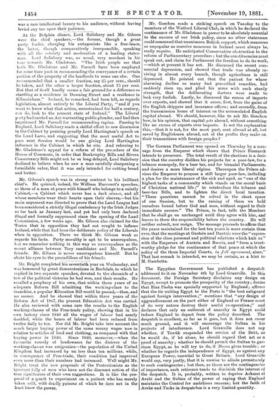At the Dolphin dinner, Lord Salisbury and Mr. Gibson were
the chief speakers,—the former, though a great party leader, charging his antagonists like a free-lance, the latter, though comparatively irresponsible, speaking with all the sobriety and moderation of a leading states- man. Lord Salisbury was, as usual, very mordant in his tone towards Mr. Gladstone. "The Irish people see that both Mr. Gladstone and Mr. Parnell have been employed for some time past in recommending the conveyance of a certain portion of the property of the landlords to some one else. One recommended that a smaller fraction, say 25 per cent., should be taken, and the other a larger fraction, about 75 per cent. But that of itself hardly seems a fair ground for a difference so startling as a residence in Downing Street and a residence in Kilmainham." Ireland, he remarked, had been left, as regards legislation, almost entirely to the Liberal Party, " and if you want to know what that action, unrestrained for half a century, c in do, look to the present state of Ireland." The Liberal p arty had carried an Act warranting public plunder, and had then imprisoned Mr. Parnell for recommending rapine. Passing to England, Lord Salisbury made a skilful effort to sow dissension in the Cabinet by praising greatly Lord Hartington's speech on the Land Laws, and suggesting that the most useful Act to pass next Session would be one giving Lord Hartington influence iu the Cabinet in which he sits. And referring to.
Mr. Gladstone's appeal for a reform of the prosedure of the House of Commons, in order that Bankruptcy Bills and Rivers
Conservancy Bills might not be SQ long delayed, Lord Salisbury declined to believe when he saw a man carefully sharpening a formidable sabre, that it was only intended for cutting bread and butter.






































 Previous page
Previous page